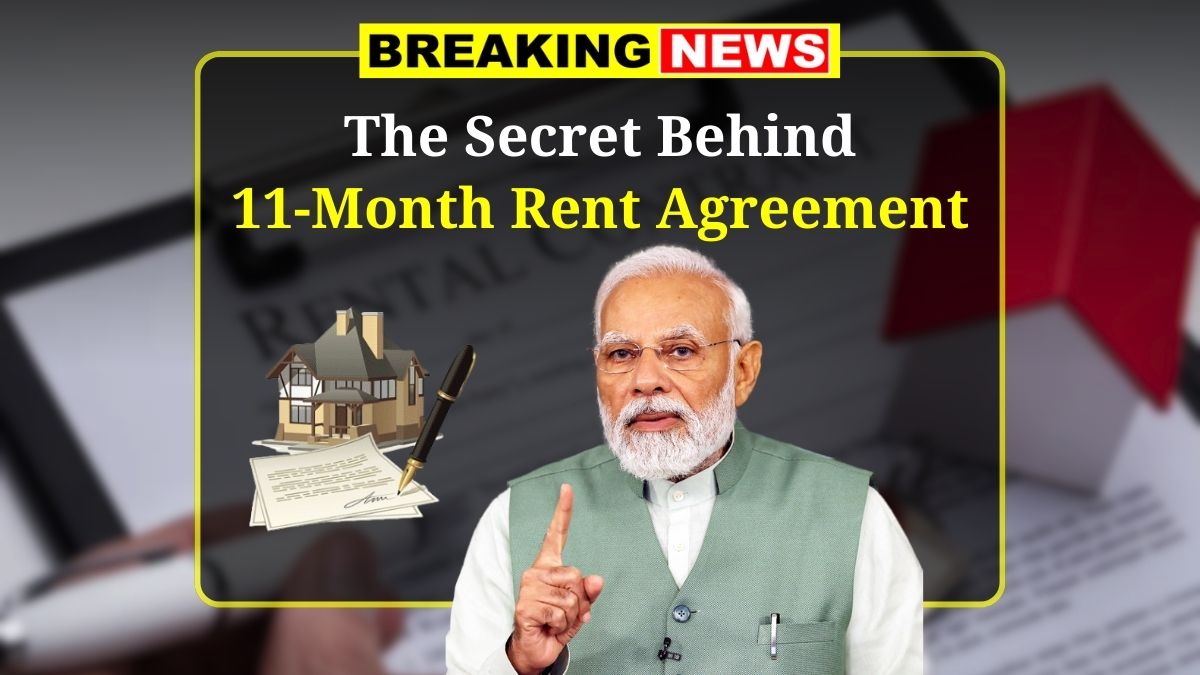Rent Agreement Rule – In India, the 11-month rent agreement is a common practice for many tenants and landlords. This short-term lease offers a lot of flexibility and convenience, making it a popular option for those looking for a simple rental arrangement. But what makes it so widely used, and why do both landlords and tenants prefer it? Let’s dive in.
Why Choose an 11-Month Agreement?
The 11-month lease is often the go-to choice because it avoids the need for mandatory registration, which becomes applicable only for leases that are 12 months or longer. The process of registering a rental agreement involves additional costs, including stamp duty and registration fees. By sticking to an 11-month term, both the tenant and landlord save money and time. It’s a quick and easy setup, with minimal legal formalities involved.
Key Elements to Consider
There are a few key aspects to think about when entering into an 11-month lease. First, the rent amount is one of the most important points to negotiate. This will form the basis of the agreement, so it’s essential to agree on a fair figure that suits both parties. Then, there’s the security deposit. It’s crucial to have clear terms about how much the deposit will be and the conditions under which it will be refunded when the lease ends.
Next, maintenance responsibilities should be clearly defined. Sometimes tenants and landlords have different expectations about who will handle repairs or regular maintenance, so spelling this out in the agreement is important to avoid confusion later. Similarly, understanding the renewal terms is key.
How and when the lease can be renewed should be discussed ahead of time, so there are no surprises when the term is coming to an end. Finally, a termination clause should also be included. This outlines how either party can end the lease early if necessary and the conditions under which that might happen.
Why 11 Months?
So why does the 11-month period make such a difference? The timing is strategic. In India, the Registration Act of 1908 requires that leases of 12 months or more must be registered. Registering a lease involves costs such as stamp duty and registration fees, which can add up quickly. By keeping the term just under 12 months, tenants and landlords can avoid these extra expenses. This makes 11-month leases an appealing option for those who want to avoid unnecessary costs while still having a formal agreement in place.
Advantages of 11-Month Agreements
One of the main benefits of an 11-month agreement is the lower upfront cost. Without the need for registration, the process is much quicker and less expensive. This makes it especially appealing to those who don’t want to get bogged down with paperwork or fees. Another advantage is flexibility. Since the term is relatively short, it gives both parties the option to reassess the situation after 11 months, renegotiate rent, or even choose to relocate if needed.
This makes it ideal for people in transitional periods or those who aren’t sure where they’ll be in the long run. However, there are some potential drawbacks to consider. One of the main concerns is the lack of long-term stability.
Since the lease is only for 11 months, tenants may find themselves needing to renew the agreement frequently, which can be a hassle. Additionally, landlords may increase rent annually, which can be tough for tenants on a tight budget. Moreover, while the agreement is legally binding, it doesn’t offer the same level of protection as a registered agreement. In case of disputes, tenants may find it harder to get legal recourse.
Legal Aspects of Rent Agreements
When comparing an 11-month agreement to a registered agreement, the legal standing differs. An 11-month lease is considered informal and doesn’t provide the same level of legal protection. Dispute resolution is often handled privately, which can make things easier and quicker. However, this means tenants and landlords might not have formal legal recourse if things go wrong. On the other hand, registered agreements are formal and provide more comprehensive protection. They also come with a clear dispute resolution process that involves the courts if necessary.
Tips for Tenants and Landlords
For tenants, it’s essential to read the lease agreement carefully and negotiate terms that suit their needs. Verbal agreements should always be documented in writing, and tenants should keep a copy of the signed agreement. Knowing your rights as a tenant is crucial, as laws vary across regions.
Landlords should screen tenants carefully to avoid any future issues and be transparent about expectations. Maintaining clear communication about the property’s upkeep and having a plan for regular maintenance can also help avoid disputes. Keeping up to date with rental laws is important to stay compliant and avoid potential legal issues.
Future Trends in Rent Agreements
The rental landscape in India is changing, with increasing digitalization of rental agreements. In addition, new rental laws might be implemented to provide more protection for tenants. The rise of co-living spaces is also changing how people rent, with more flexibility and shared spaces becoming the norm. These trends may influence how rental agreements evolve in the future.
11-month rent agreements are an important part of India’s rental market, offering flexibility, lower costs, and quicker arrangements for both tenants and landlords. While they come with some limitations, understanding the terms and conditions can help both parties manage their rental experience effectively. Whether you’re renting for the first time or you’ve had several leases, knowing the ins and outs of these agreements can make a big difference.
Disclaimer
Also Read:
 Landlord Rights : Big Relief for Property Owners – Court Ends Forced Occupation by Tenants
Landlord Rights : Big Relief for Property Owners – Court Ends Forced Occupation by Tenants
The information provided in this article is for general informational purposes only. Rental laws and practices may vary by location and are subject to change. Always consult with a legal expert or real estate professional to ensure you are fully informed about your rights and obligations under local rental laws.




